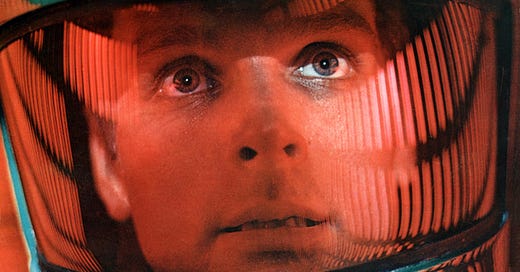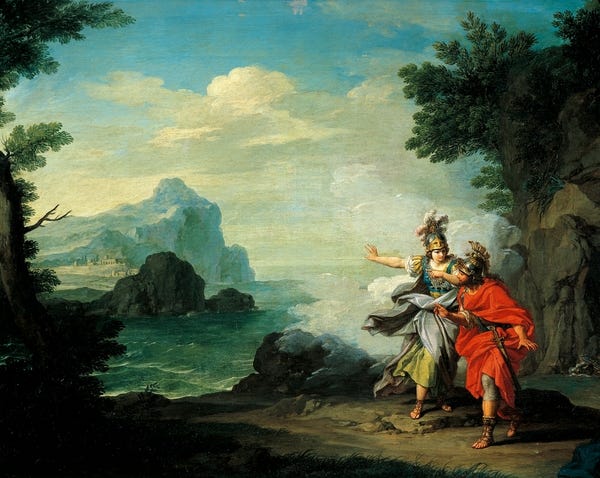Last year, I had the opportunity to watch 2001: A Space Odyssey in 70mm. Stanley Kubrick’s masterpiece, a cultural and artistic epoch influencing every reputable filmmaker and creative since its 1968 premiere, had been on my mind for many years, but I knew if I were to really experience this film for the first time, it had to be the way Kubrick intended — with a bunch of film nerds in Santa Monica on the big screen.
With this film, Kubrick and collaborator Arthur C. Clarke wanted to transcend the science fiction genre. Their plan was to tell a story in the realm of myth: a “mythical documentary” as Kubrick was to later say. For them, to resemble a myth was to stimulate a deeper level of the subconscious, the Jungian shadow that cannot be accurately described but merely felt (this comparison was further cemented through the movies’ eventual title, A Space Odyssey, a light reference to Homer’s Odyssey). For Kubrick, this was more effectively achieved not through dialogue-driven narrative, but through the visual and the nonverbal. What results is a movie that does not concretely explain its intent, but allows us to experience and feel it.
Initially, to me, this idea felt contradictory to logic. Would clarity in intent not be the superior method to penetrate our consciousness? Surely, a clear, concise answer for x, y, or z would give us a deeper and more sound understanding? If not, then why not? Here, I want to make an attempt to rationalize the difference between these two storytelling phenomena and how one may resonate more with the audience. Let us call them The Experience and The Explanation.
The Experience is the phenomenon in which one unconsciously assimilates a story. To be conscious of The Experience is paradoxical, for then you’re in the act of observing The Experience outside of itself. Naturally, our post-Enlightenment resurgence into reason, into the metaphysical ideas that shape our understanding of being, no less the rapid technological progress influencing our present-day, overly self-conscious reality, has made The Experience harder to experience in a piece of art, even more so for the artist to create it. But, an artist who is able to conjure The Experience for a viewer, is in a better position to both express their intention and to instill that intention subconsciously into the viewer, bringing us closer to the spiritual potentialities of human life.
Humans have been achieving and entering The Experience since the earliest days of art and storytelling, from Greek Tragedy to the earliest days of myth. Carl Jung would call The Experience the tapping into our “collective unconscious”. Now whether or not you agree with Jung’s specific definition of the collective unconscious or its archetypes, it cannot be denied that humans resonate with specific stories more than others. In fact, what got me started on this entire subject was that question: what do the greatest films, the greatest works of literature, have in common? And it always has to do with the way these works emulate the human experience. Experiencing ‘The Experience’ is the human experience at its deepest level. Now, this isn’t always accomplished or represented in the same way. As we have grown in our knowledge, so have the works of art grown in their evolution. For better or worse, the intention of the artist and the story must be interwoven subtly, now more than ever, for us to enter this sacred land.
2001 was the closest I have ever gotten to The Experience. I was never questioning, never aware of the film as a film, only experiencing it. My friends half-jokingly called it “a religious experience”, as if we were being told the meaning of life, and to me this was accurate. I had never been able to submit myself to the beliefs of organized religion, an actuality that has only further burdened my mental state, but with this film, I was able to at least understand how others feel about their own beliefs. Because although this film was a “trick” in the sense that I knew it was not the true meaning of life, I felt that it were without a conscious interference. I was brought closer to humanity and to myself, and even if only for a finite moment, I was given the nurturing warmth of certainty.
I have always said that becoming an artist professionally is to sacrifice the ease in which you can experience The Experience. Once you study art itself, you begin to understand the strings that hold it together. The illusion is gone, or at least partially. It may take a Kubrick or a Beethoven to bring you back, which is safe to say it will not happen often. But that is ok, because as Kandinsky once said, dedicating your life to art is to become a servant to art and to help the cause of art. To give yourself to this cause, and therefore to further yourself from the Experience, is a service that represents its own experience, one that lived then died, like a child becoming aware of itself. But it can live again. It may be a difficult life to achieve, but it is an admirable one, and it is, I hope, one that I can bring upon to you that are reading.
So to bring this all to my main point: art, or more specifically stories, whether a book or a movie or a video game, that better emulates the Experience for the audience better expresses the artist’s intention, and thus makes it a truer art. This does not require the story to be ‘realistic’ in that behaves in our physical reality’s limitations, but rather that it most accurately resembles our mind’s Experience. To create a deeper level of Experience, the artist must find a balance between their direct intention and the way that intention unfolds in the story, either through a conscious or unconscious effort. Stories that do not find this balance fail to capture The Experience. In fact, they capture a far worse phenomenon — The Explanation. The Explanation is a story that one may consider ‘on-the-nose’ or ‘unsubtle’. The artist sacrifices The Experience to make sure you understand what they want to say, and in turn it doesn’t penetrate our consciousness in the same way. The Explanation will feel uncanny; it will feel forced upon the viewer like a poor school lecture, showing its hand far too easily.
In today’s art culture, The Explanation reigns supreme. Whether an outdated, postmodern awareness of itself and its structure, or an incessant word-salad of backstory, or a forced message brimming with metacommentary, the artist craves to reveal him or herself, and the audience craves to understand. Neither are experiencing, they are merely affirming themselves in an onanistic, self-indulgent manner. This result derives from a lack of understanding, of art and of craft, and it also derives from our increasing need for self-assurance. It is obvious when an artist is not aware of our past, of the history of art and of humanity, and what results is a facade. The Explanation is easily made, and it is easily consumed and praised. We must not give into this temptation. We must challenge ourselves to understand deeper and to risk the feeling of rejection or condemnation, so the audience can experience something true.
And yet, I feel I have not fully answered the question of why The Experience resonates more than The Explanation. I have merely observed the phenomenon and assumed, perhaps undeservedly, that one is more correct based on the history of humanity and art. But, like all of us, I do not have that answer. I can only feel what is right. Eventually, we may have all of the answers: every emotion, every movement, every thought, every particle within and outside of ourselves, will have its full logical explanation. The meaning of life and the phenomenon of consciousness will be understood, let alone what makes a good story. But by then, stories will no longer serve a purpose. Nor will art, nor music. These are the tools for which we enter The Experience, let us not forget.
When we left that Santa Monica theater, the inevitable discussion of what 2001 ‘meant’ began. A friend was quick to note that Kubrick and Clarke revealed the film’s meaning. Not only their intention, but the meaning of every minute detail. He asked if I wanted to watch the interview on YouTube…
…and for that brief moment, God’s hand extended to me, asking if I was ready to understand. I wanted it, we all want it. It is only natural for a deprived soul to crawl towards certainty. But I could not. It is against my nature to know rather than to experience, as difficult as that is. But I am all the better for it.






